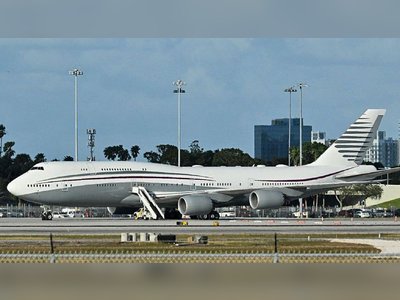US Evacuates Non-Essential Staff in Iraq, Bahrain, and Kuwait Amid Rising Tensions with Iran
In response to escalating threats, the United States has ordered a voluntary evacuation of non-essential embassy staff and military families from key locations in the Middle East.
The United States has authorized the voluntary departure of all non-essential personnel from its embassies in Baghdad, Iraq, and in Bahrain and Kuwait, amidst increasing tensions with Iran and regional instability.
U.S. officials have confirmed that this decision aligns with a broader strategy aimed at ensuring the safety of personnel and maintaining operational readiness in the Central Command region.
The move comes in the wake of indictments from Iranian officials regarding potential military responses to threatened U.S. interests in the Middle East.
The U.S. Defense Department communicated that Secretary of Defense Pete Hegseth underscored the priority of safety for military families, approving voluntary departures from military installations as well as diplomatic outposts.
Central Command has indicated that it is coordinating closely with the Department of State and allied nations to manage the increasing tensions.
The ongoing situation is particularly influenced by ongoing negotiations regarding Iran's nuclear program, which have been marred by confrontational rhetoric from both sides.
In past statements, the Iranian government has asserted that it stands ready to retaliate against any perceived aggression, with Iran's military leaders vowing to target U.S. military bases in the region should conflicts escalate.
Iran's Deputy Foreign Minister has warned that the country is prepared for adverse resolutions that might emerge from the International Atomic Energy Agency (IAEA), viewing such actions as politically motivated.
Iranian President Masoud Pezeshkian asserted that the country would not yield to external pressures and emphasized Iran’s resolve to maintain its defensive capabilities.
Simultaneously, U.S. President Donald Trump has expressed skepticism regarding Iran's willingness to cease uranium enrichment, stating that he perceives the negotiations to be less optimistic than two months prior.
The UK’s Maritime Trade Operations agency has issued a warning to vessels in the region, indicating the heightened tensions might lead to escalated military activity impacting maritime operations, particularly in the Persian Gulf and the Strait of Hormuz.
The agency has urged maritime entities to exercise caution in light of potential conflicts.
As military readiness remains a focal point for the U.S., continued monitoring and diplomatic efforts are ongoing, contributing to the dynamic geopolitical landscape surrounding Iran’s nuclear ambitions and regional military engagements.
U.S. officials have confirmed that this decision aligns with a broader strategy aimed at ensuring the safety of personnel and maintaining operational readiness in the Central Command region.
The move comes in the wake of indictments from Iranian officials regarding potential military responses to threatened U.S. interests in the Middle East.
The U.S. Defense Department communicated that Secretary of Defense Pete Hegseth underscored the priority of safety for military families, approving voluntary departures from military installations as well as diplomatic outposts.
Central Command has indicated that it is coordinating closely with the Department of State and allied nations to manage the increasing tensions.
The ongoing situation is particularly influenced by ongoing negotiations regarding Iran's nuclear program, which have been marred by confrontational rhetoric from both sides.
In past statements, the Iranian government has asserted that it stands ready to retaliate against any perceived aggression, with Iran's military leaders vowing to target U.S. military bases in the region should conflicts escalate.
Iran's Deputy Foreign Minister has warned that the country is prepared for adverse resolutions that might emerge from the International Atomic Energy Agency (IAEA), viewing such actions as politically motivated.
Iranian President Masoud Pezeshkian asserted that the country would not yield to external pressures and emphasized Iran’s resolve to maintain its defensive capabilities.
Simultaneously, U.S. President Donald Trump has expressed skepticism regarding Iran's willingness to cease uranium enrichment, stating that he perceives the negotiations to be less optimistic than two months prior.
The UK’s Maritime Trade Operations agency has issued a warning to vessels in the region, indicating the heightened tensions might lead to escalated military activity impacting maritime operations, particularly in the Persian Gulf and the Strait of Hormuz.
The agency has urged maritime entities to exercise caution in light of potential conflicts.
As military readiness remains a focal point for the U.S., continued monitoring and diplomatic efforts are ongoing, contributing to the dynamic geopolitical landscape surrounding Iran’s nuclear ambitions and regional military engagements.











